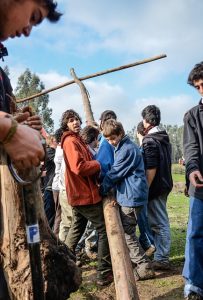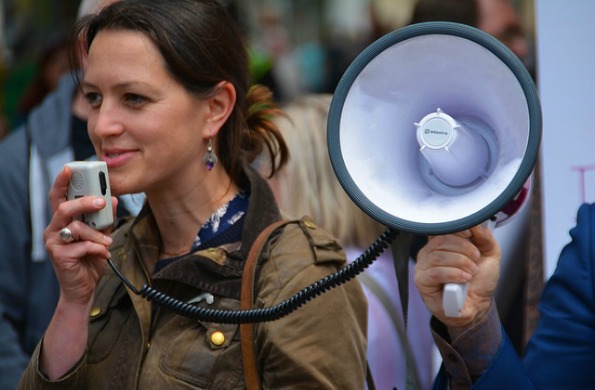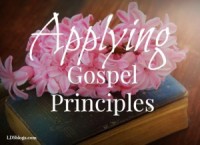In watching the equality marches this week, I reflected on the causes I’ve passionately joined over the years. This is not a post for or against the current marching, just a few musings about a time I stood up against a grievance.
My First March for Equality
My first march for equality. I rallied young women in my class together and we marched to the Bishop’s office requesting rights equal to the young men. The Boy Scouts planned a high adventure trip to Mexico to earn some merit badges. So we asked to do a high adventure experience, too. Young women had never (as far as we knew) been allowed to do anything like that in our stake.
 The request was denied due to a concern for our safety. Frustrated, I worked myself into full blown rebellion complaining that we couldn’t go because we might break a nail or because our delicate features might blemish. I was angry and bitter at the inequality between the guys and gals. I thought I was tougher than most of the boys going to Mexico. I was furious to be considered less than them or too delicate for adventure. I’d never rebelled like that before.
The request was denied due to a concern for our safety. Frustrated, I worked myself into full blown rebellion complaining that we couldn’t go because we might break a nail or because our delicate features might blemish. I was angry and bitter at the inequality between the guys and gals. I thought I was tougher than most of the boys going to Mexico. I was furious to be considered less than them or too delicate for adventure. I’d never rebelled like that before.
As a Latter-day Saint, hierarchy had always been horizontal to me (with very few exceptions like the First Presidency and Quorum of Twelve Apostles), not vertical. Men and women have always been equal contributors in my eyes. The very nature of callings and service in the church perpetuated this view, even as a teenager. The Gospel doesn’t change, but people in callings do. I believe in and respect the mantle of authority. But I’ve learned that humans, myself included, are subject to frailty, ego, and pride.
Just because an adult or leader told me something didn’t automatically make it absolute or true for me. And just because something’s always been done one way certainly doesn’t mean it must continue in perpetuity. I’d been taught to know the scriptures and the doctrines of the Gospel, to consult words of living prophets and the Handbook of Instructions for administrative questions, to receive revelation to prayers and to confirm truth through the Holy Ghost. I also knew that I didn’t know it all and I needed to seek constantly. Acknowledging personal responsibility to seek and receive the Lord’s truth and then follow it (changing direction on a dime if needed) is one of the greatest gifts my parents gave me.
I’ve bumped into a sort of expectant authority a lot—including the day of my missionary farewell. I was cornered and told by a man, who’d been a leader that I’d respected, that I shouldn’t serve a mission because he’d received a revelation that I should marry his son. My answer angered him. Maybe I was supposed to marry his son, but the Lord had not revealed that to me yet. The Lord had affirmatively answered my prayer to serve a mission. If his son truly respected me and my relationship with the Lord, he would support me on my mission and we’d see what happened when I returned.
The March
My wise young women’s leader, probably tired of my complaining, suggested I talk to the bishop about my concerns about the denied high adventure request. The other girls and I rallied behind this idea. Our young women’s leader said she’d go with us to talk to him, but we were to lead the discussion. She suggested we pray about the purpose of our “demands” and try to understand that the bishop’s directive came from the stake president.
 We “marched” into the bishop’s office prepared with why and how the experience would benefit us. Admittedly, I did offhandedly comment about feeling like they were worried because we’d break a nail, but the rebellious attitude generally dissipated by following my young women leader’s counsel. Praying about hows and whys usually dissipates my rebellious attitudes. While meeting with the bishop, we all really just tried to understand each other. He said he could support our initiative, but we needed the stake president’s approval.
We “marched” into the bishop’s office prepared with why and how the experience would benefit us. Admittedly, I did offhandedly comment about feeling like they were worried because we’d break a nail, but the rebellious attitude generally dissipated by following my young women leader’s counsel. Praying about hows and whys usually dissipates my rebellious attitudes. While meeting with the bishop, we all really just tried to understand each other. He said he could support our initiative, but we needed the stake president’s approval.
We ended up “marching” to the stake president’s office, who was a much harder sell. He had specific views of how to be a proper young lady. I opposed many of those views. He and I “clashed” several times over things I planned for my life. He thought I was too young to receive my patriarchal blessing at 14. He resisted signing my recommendation for BYU’s Israel study abroad. He didn’t approve of girls going on high adventure adventures. I came to understand that he sincerely felt concern for my soul and safety, but that understanding did not come to me easily.
I learned quickly, following the advice of my young women’s leader, that the strongest method to approach him was to explain the circumstance, how I’d felt led to my conclusion, listen to his concerns and reticence, and then ask him to pray about the request.
We went on an adventure each summer my remaining young women years. We weren’t approved to go into Mexico like the Boy Scouts—the reasons all explained to us—however, I did fall out of the raft on the Mexican side of the Rio Grande while river rafting. I also received my patriarchal blessing and study abroad recommendation as requested.
The March’s Impact
I learned a lot from those experiences as a teenager. Firstly, I learned that a humble man can change his preconceptions and biases by earnestly listening, trying to understand, and praying for direction. I learned so much by his humility. Even in our differences, my respect for him skyrocketed (and remains skyrocketed to this day) because of how he sincerely sought to provide direction, show love and concern for our souls, and correct a breach.
He taught me to see the person, see the need, and confer with the will of the Lord, because he did that with me. I love him for caring about us enough to have strong opinions about our safety. And I love him for caring about us enough to change his opinions as he felt prompted by the Holy Ghost.
 I learned that in his bias, which I felt choked my freedom, he felt held me in the utmost respect and honor. The stake president and I both felt like we were right. Realizing that two people, both trying to live the Gospel as best they can, can have such radically different views has really tempered my judgment.
I learned that in his bias, which I felt choked my freedom, he felt held me in the utmost respect and honor. The stake president and I both felt like we were right. Realizing that two people, both trying to live the Gospel as best they can, can have such radically different views has really tempered my judgment.
I didn’t agree with the reasons he didn’t approve our trip to Mexico, but I learned valuable lessons in compromise. We were able to do something else. I recognized his compromise as well and I really respected his efforts to understand us. The young men didn’t go to Mexico again during that time frame, which also showed his respect for us.
I learned the difference between persisting in my angry rebellion and pursuing a more Christlike approach. I felt completely different in the new approach suggested by my young woman’s leader and I felt the Holy Ghost help me…as opposed to being devoid of the Holy Ghost because of my anger. This lesson’s persisted into my adult life. When I feel contentious, I know I’m on my own with regrets to follow. I wish I could say I’m perfect at this, I can’t. But I’m more aware than I used to be.
I learned that we could stand up for things that frustrated us. We could gain understanding. We could affect change.
Sometimes change isn’t forthcoming. A decision looms at that juncture. I decided what I’d do in those circumstances long ago. I communicate my feelings, thoughts, concerns to the priesthood leader with stewardship. I listen to him. Understanding is a key for me. I’ve always felt heard in my approach. Ultimately, the bishop/branch president and stake president has authority for my ward/branch and stake. I’ve covenanted to sustain them. There’s very few times I’ve been in this kind of situation, but if they’ve prayed about their decision and it’s not changing, then I pray for God to help me find peace and change my attitude.
The most important lesson I learned from that first march was that my grievance is infinitely small compared to injustices faced in varying degrees by people in my community and around the world today. I feel free. To me, the Gospel is liberating. But all around me, people fight—today, right now–for freedoms I take for granted–like a homeland, and safety, and education, and speech.
These lessons, of course, continue to lead to introspection. What are my biases? Am I even aware of others’ struggle? How do I support humanity’s freedoms? Am I bound in the midst of my freedoms? Do I believe everyone should be free?
I love this image—that was once a reality in a civilization. It’s been done. It’s a real possibility.
To read more of Delisa’s articles, click here.
“And there were no contentions and disputations among them, and every man did deal justly one with another. And they had all things common among them; therefore there were not rich and poor, bond and free, but they were all made free, and partakers of the heavenly gift.”
The scriptures convey God’s greatest respect to our freedom and to our equality. I appreciate leaders who lead with this ideal in mind.
“He invited them all to come unto him and partake of his goodness; and he denieth none that come unto him, black and white, bond and free, male and female…and all are alike unto God.”
In our quest to be like God, this is a critical component characteristic–all are alike unto God. We want that equality for ourselves. Do we want it for everyone else? How do we really view all of our fellow humans?
About Delisa Hargrove
I am a member of The Church of Jesus Christ of Latter-day Saints. I have moved 64 times and have not tired of experiencing this beautiful earth! I love the people, languages, histories/anthropologies, & especially religious cultures of the world. My life long passion is the study & searching out of religious symbolism, specifically related to ancient & modern temples. My husband Anthony and I love our bulldog Stig, adventures, traveling, movies, motorcycling, and time with friends and family.








I guess that’s why when I was in Beehives we went on a rafting trip. Must have been your influence years before. So Thanks!
I’ve been thinking a lot about this. How what I perceive as right and just is not always the way things happen. I definitely have an opinion but am often humbled by the Lord to accept another idea or way of doing pretty much the same thing. Psalms 37 has been a real title of liberty for me lately.
Great article.
LOL 🙂
I have similar experiences. And I usually really appreciate the new way. I’m going to go read Psalms 37 now.
Thanks for your comment!